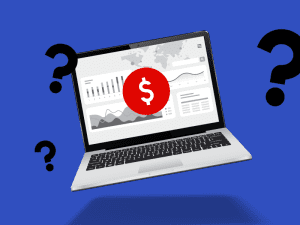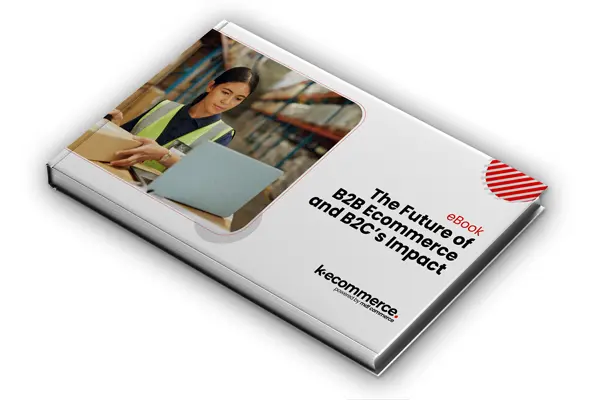
What is the Cost to Build a B2B Ecommerce Platform?

Marketing Team
k-ecommerce

Digital commerce has become a key part of many business-to-business companies’ operations. In fact, McKinsey reports that 71% of these businesses now offer ecommerce capabilities.
A key driver of the increased focus on ecommerce in the B2B arena is a shift in customer shopping preferences. Today’s B2B buyers increasingly favor online transactions over in-person interactions. McKinsey’s research again proves this trend — the study found that ecommerce is currently the most effective sales channel for B2B companies, accounting for 34% of revenue, compared to just 17% from in-person sales.
Beyond that, many B2B firms have realized that digital ecommerce offers numerous benefits and possibilities, including access to a broader market, better customer experiences, and greater operational efficiency.
But exactly how much does it cost to build a B2B ecommerce platform? And what factors affect how much you pay in total? Here’s what you need to know.
Why Invest in a B2B Ecommerce Solution? Key Benefits
 Before we get into B2B ecommerce platform costs, let’s first look at some of the benefits of investing in this sales technology.
Before we get into B2B ecommerce platform costs, let’s first look at some of the benefits of investing in this sales technology.
Better Customer Experiences
A B2B ecommerce platform offers customers a seamless, user-friendly sales interface that’s available 24/7. Unlike traditional purchasing methods, which often require in-person visits or phone calls, an ecommerce solution allows B2B customers to browse products and place orders at their convenience. What’s more, B2B ecommerce empowers you to offer more personalized experiences that cater to the specific needs of individual customers. For example, you can create personalized product catalogs and pricing structures based on the customer’s purchasing history and preferences. Personalization shows you’re attentive to customer needs and unique circumstances and can enhance satisfaction and foster loyalty. At a time when capturing customer attention is more challenging than ever, delivering a personalized experience sets you apart from your competitors. In a survey by Exclaimer, 86% of B2B marketing leaders cited 1:1 personalization as essential for success in the current B2B business environment.Greater Market Reach
B2B ecommerce enables you to extend your business’s reach beyond local or regional markets to engage with customers around the globe. This expanded reach opens up profitable new sales opportunities.Enhanced Operational Efficiency
B2B ecommerce platforms allow you to automate many processes that would otherwise need manual handling, such as order management, invoicing, and inventory tracking. Automation can lead to faster order fulfillment and improved overall service levels. It also cuts down labor costs, minimizes the risk of human errors, and frees up your team to focus on more strategic, high-value activities. Many B2B ecommerce platforms also integrate with existing business systems like CRM, ERP, and accounting software. This integration allows for streamlined workflows and eliminates data silos. It makes sure all teams and departments are aligned and working toward the same goals.Better Data and Analytics
Modern B2B ecommerce platforms often come equipped with built-in analytics and reporting features or allow you to integrate third-party tools. For example, k-ecommerce offers integrations for Amazon, Mailchimp, and more. These tools offer valuable insights into various aspects of your business, such as customer behavior, purchasing patterns, and sales trends. The insights can guide important business decisions, from marketing strategies to product offerings and pricing. For instance, if analytics reveal a spike in demand for a specific product category during certain months of the year, you can plan ahead by stocking up extra inventory or launching targeted marketing campaigns to maximize sales during this peak period.What Factors Affect the Cost To Build a B2B Platform?
 B2B ecommerce pricing can vary significantly based on several factors, from the platform you choose to the features and integrations you want to include.
B2B ecommerce pricing can vary significantly based on several factors, from the platform you choose to the features and integrations you want to include.
Platform Choice
Each ecommerce solution comes with different initial setup and monthly/annual subscription fees, whether you choose one built specifically for B2B, like k-ecommerce, or something traditionally geared toward B2C that has B2B capabilities, like Shopify Plus, BigCommerce, and Adobe Commerce (formerly Magento). Do some comparison shopping to find the option that offers the best balance between your business needs and budget.Features and Functionality
The number and complexity of features on your B2B ecommerce platform directly affect the total cost. Advanced functionalities — such as personalized product catalogs and pricing, customer portals, and bulk ordering — will drive up expenses. To keep costs in check, evaluate which B2B features are truly essential for your ecommerce business and avoid overpaying for functions you may not need.Third-Party Integrations
Integrating your B2B ecommerce store with backend systems (like ERPs and CRMs) or plugins and addons (like payment gateways) is necessary for optimal operations. However, these integrations cost money, and the more you have, the greater the costs. Costs can also vary based on the nature of the integration. For example, systems that require custom application planning interface (API) development to integrate with your ecommerce platform come with higher setup and maintenance expenses. When shopping for B2B ecommerce software, look for those that offer built-in integration capabilities — such as k-commerce’s ERP-integrated solution — to drive down development costs.Design and Customization
The design and customization needs of your B2B ecommerce website will also affect the cost. A highly customized user interface (UI) — that aligns with your brand identity, for example — requires more time, resources, and expertise, driving up costs.How Much Does a B2B Ecommerce Platform Cost?
 The cost to set up a B2B platform ranges from $10,000 for a simple, no-frills option to $150,000+ for a complex, feature-rich solution. These costs cover:
The cost to set up a B2B platform ranges from $10,000 for a simple, no-frills option to $150,000+ for a complex, feature-rich solution. These costs cover:
- Platform license or initial setup fees
- Design and customization
- Initial content creation
- Third-party integrations
- Data migration
- Security setup
- Team onboarding
- Monthly/annual subscription fees
- Hosting
- Ongoing maintenance and technical support
- Software and security updates
- Marketing and search engine optimization (SEO)
- Performance monitoring and analytics
B2C vs. B2B Ecommerce Platform Cost
 B2B ecommerce platforms typically cost more to develop and run than B2C ecommerce solutions for several reasons.
B2B ecommerce platforms typically cost more to develop and run than B2C ecommerce solutions for several reasons.
- Complexity of purchasing processes: B2B ecommerce platforms handle more complex workflows — such as custom pricing, bulk ordering, and multitiered approvals — than their B2C counterparts. These complexities require a more sophisticated platform setup, which costs more to both build and maintain.
- User management and permissions: B2B ecommerce sites support complex user roles and permissions. For example, they allow multiple users from the same company to access different areas of the platform, such as procurement, accounting, or management. This multiuser functionality calls for additional development and ongoing management, which drives up costs. In contrast, B2C platforms typically only include single-user accounts and, thus, are less expensive to run.
- Payment processing: B2C online stores generally handle simple, straightforward transactions, such as credit card payments. These are relatively less costly to implement. On the other hand, B2B includes more complex payment options, including purchase orders, credit terms, and invoicing. These additional functionalities lead to higher setup and ongoing operational costs.
- Sales cycle and customer journey: The B2B sales cycle is typically much longer and involves more touchpoints than B2C. This requires advanced features and functionalities, like quoting systems, contract management, and recurring orders. Each of these functionalities adds to the total cost to build and run the platform. B2C platforms are generally designed for shorter, more transactional customer journeys. Therefore, their costs tend to be lower.
- Integrations: As we saw, B2B businesses often need to integrate their ecommerce platforms with existing systems, like ERPs, CRMs, and inventory management, to streamline workflows. These integrations can significantly increase initial setup and ongoing maintenance expenses. B2C platforms generally have fewer integration requirements, which keeps their costs lower.
Can You Use a B2C Ecommerce Platform for B2B Activities?
Technically, you could use a B2C platform, but it’s not an ideal solution. While it can be a cost-saving option, a B2C ecommerce platform simply lacks the features and functionality needed for smooth and scalable B2B operations. The result could be a disjointed user experience, which would frustrate your clients and limit your sales opportunities. To put it bluntly: The downsides often outweigh the benefits. For the best customer experience and business outcomes, invest in a dedicated B2B ecommerce solution instead.Final Thoughts: B2B Ecommerce Platform Cost — A Complete Guide
An ecommerce platform is a critical tool for modern B2B businesses looking to gain an edge in what is currently a very competitive landscape.
The benefits of investing in a B2B ecommerce solution are numerous — better customer experiences, greater market reach, higher operational efficiency, improved analytics, and many more.
With Gartner predicting that 80% of all B2B sales interactions will occur via digital channels by 2025, now is the perfect time to invest in a B2B ecommerce solution if you haven’t already.
As we’ve seen, the cost of building these platforms can range anywhere from $10,000 to over $150,000 for initial setup, with ongoing costs of between $1,000 and $10,000+ per month.
For an affordable and reliable option, check out k-ecommerce’s ERP-integrated solution. It’s designed with the needs and demands of modern B2B buyers in mind — offering features like personalized product catalogs, bulk ordering capabilities, and secure payment options to ensure a seamless online shopping experience for your customers.
Request a free demo today to learn more.


